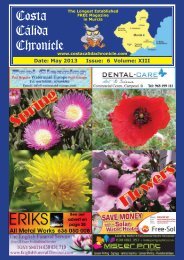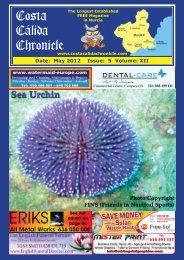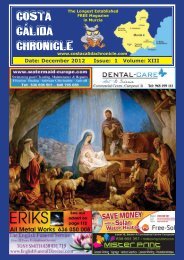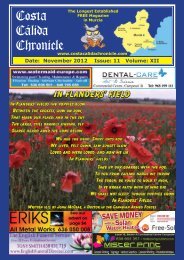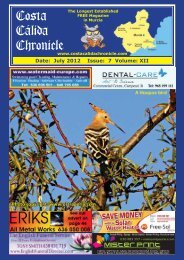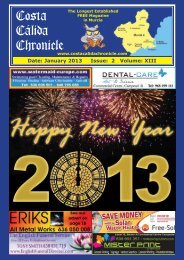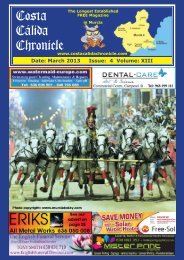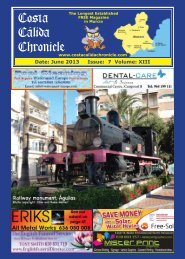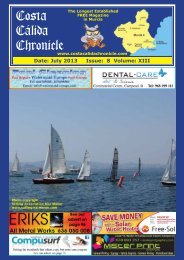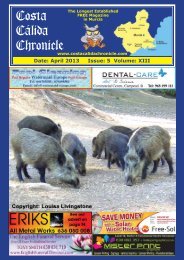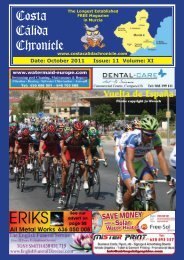September 2012 - Costa Calida Chronicle
September 2012 - Costa Calida Chronicle
September 2012 - Costa Calida Chronicle
Create successful ePaper yourself
Turn your PDF publications into a flip-book with our unique Google optimized e-Paper software.
In association with <strong>Costa</strong> Cálida International Radio and www.angloINFO.com<br />
When a child is born in Spain, it is common<br />
practice for an obstetrician to oversee the<br />
birth. Following the birth, the mother will receive<br />
a health booklet for the baby called a<br />
Cartilla de Salud Infancia y Adolescencia.<br />
If the baby is born at home, the health<br />
booklet can be obtained from the nearest<br />
health centre during the baby’s fi rst visit. The<br />
booklet includes information on vaccinations,<br />
and health and education recommendations<br />
for children from birth to adolescence. There<br />
is also space for the medical centre or practitioner<br />
to sign and stamp the booklet after<br />
examinations or vaccinations.<br />
Toddler Health Care and Benefi ts<br />
Spain has a national health service, Seguridad<br />
Social, fi nanced by social security contributions<br />
and run by the various autonomous<br />
health departments throughout the country.<br />
Residents need a social security number to<br />
qualify for treatment.<br />
The Spanish healthcare system is generally<br />
acknowledged to be very good. Most hospitals<br />
are modern and well-equipped and the doctors<br />
and paediatricians are excellent. However,<br />
do not assume that they will speak much<br />
English even in the resort areas and major<br />
cities. In some areas there will be someone<br />
providing a voluntary translation service to<br />
help with doctor’s appointments. The local<br />
medical centre will advise if such a service<br />
exists.<br />
Day-to-day treatment of childhood ailments is<br />
managed by a General Practitioner (GP). Local<br />
anglophone Embassies and Consulates<br />
can usually provide a list of English-speaking<br />
doctors in an area.<br />
Within the National Health Service a GP may<br />
be assigned by the local medical centre (centro<br />
de salud) – it may not be possible to specify<br />
a preference. Within the private sector the<br />
choice is open. Dental treatment in Spain is<br />
managed within the private sector.<br />
Page 82<br />
Medicines and Vaccinations<br />
Medicines are always prescribed by a doctor<br />
using an offi cial prescription and the patient<br />
is required to pay approximately 40% of the<br />
government capped price.<br />
Vaccinations required can vary by year and by<br />
the area of residence.<br />
Children who attend pre-school or private<br />
nurseries are likely to be seen regularly by<br />
medical professionals.<br />
• In an emergency, go to the nearest<br />
accident or emergency hospital<br />
• If necessary, call an ambulance by dialling<br />
112<br />
Social Security Benefi ts<br />
The Spanish Seguridad Social offi ce is responsible<br />
for maternity and childcare benefi<br />
ts. Much of the website has been translated<br />
into English and provides detailed information<br />
on entitlement and how to apply.<br />
Child benefi t is paid for children under 18<br />
years of age (older if the child has a disability)<br />
as long as the place of residence is Spain<br />
and benefi ts are not being claimed elsewhere.<br />
There is a maximum limit on earnings, but<br />
this increases depending on the number of<br />
dependent children. Application must be<br />
made to the local INSS (Instituto Nacional de<br />
la Seguridad Social) offi ce.<br />
Ch ildcare and Pre-primary Education<br />
The overall education in Spain is the responsibility<br />
of the Ministerio de Educación y Ciencia.<br />
Control is managed locally and differs according<br />
to the regional education authority.<br />
Local bodies specify minimum amounts of<br />
educational activity, guidelines for opening<br />
hours, adult/child ratios, basic safety regulations,<br />
and parent/teacher consultations.<br />
Pre-school (escuela infantil)<br />
Pre-school education is available in Spain up<br />
to six years and is divided into two groups:<br />
• up to three years<br />
• from three to six years<br />
This stage is not compulsory, although the<br />
government guarantees there will be suffi -<br />
cient places in state schools to ensure schooling<br />
for those who request it free of charge.<br />
Children usually attend local schools. Normally<br />
there are 20-25 children in each class. Although<br />
traditionally a very family-orientated<br />
society with many mothers staying at home<br />
or sending small children to grandparents<br />
for care, the numbers of children enrolling in<br />
Spanish pre-schools is on the increase.<br />
For most Spanish children, school starts with<br />
nursery or pre-school in the <strong>September</strong><br />
they turn three. Compulsory education (escolaridad<br />
obligatoria), begins at six in a primary<br />
school (escuela primaria).<br />
The teaching medium is Spanish at all levels.<br />
Parents who wish their child to be educated in<br />
English will need to look at pre-schools in the<br />
private sector. There are a number of foreign<br />
and international schools in Spain, many with<br />
nursery facilities.<br />
Enrolment<br />
In general, enrolment in a pre-school takes<br />
place in the fi rst half of May, but this may<br />
vary from one province to another. Application<br />
forms can be obtained from the school<br />
itself or from the Education Department,<br />
check with the ayuntamiento of the place<br />
of residence.<br />
The following documents will be required:<br />
• Filled in application form<br />
• Child’s birth certifi cate<br />
• Medical certifi cate and proof of vaccinations<br />
• A certifi cate of registration at the<br />
Town Hall (certifi cado de empadronamiento)<br />
The certifi cado de empadronamiento is issued<br />
by the Town Hall and is the proof that<br />
the child’s family is registered on the Padrón<br />
Municipal des Habitantes, a register of all<br />
the persons living in the town. To obtain the<br />
certifi cate, a utility bill, proof of identity of all<br />
members of the family and a rental contract<br />
or Title of Deeds will be required. The document<br />
is valid for three months.<br />
Childcare in the Private Sector<br />
Childcare in the private sector is available and<br />
in the larger cities and towns there is normally<br />
a good choice of facilities. There are<br />
nurseries (Guarderias or Casas de ninos)<br />
and pre-schools (Escuelas Infantiles). Those<br />
in larger towns and cities frequently have<br />
English and Spanish-speaking staff. It is common<br />
for there to be regular visits from medical<br />
personnel as part of the services on offer.<br />
Meals are usually provided and many schools<br />
place a strong emphasis on healthy eating<br />
from a young age.<br />
It is also common for pre-schools to be registered<br />
with the Ministry of Education or with<br />
the local authorities and to publicise this as a<br />
guarantee of quality.<br />
• As the Spanish can work long hours,<br />
many nurseries stay open into the<br />
evenings all year round. Typical hours<br />
are from 7am-9pm with actual activities<br />
running from 10am-5pm.<br />
• Some nurseries provide bus services<br />
to pick up and drop off children<br />
• It is quite normal to request a visit to<br />
a nursery or facility to look round and<br />
ask questions before enrolling a child<br />
For residents in the resort areas there are often<br />
good facilities within the holiday developments<br />
that are also available to people not<br />
living there. Some resorts are happy to open<br />
their children’ clubs and facilities to non-residents<br />
all year round.<br />
Out and about with toddlers<br />
Children are rarely left at home in Spain so<br />
most places, including restaurants, are used<br />
to catering for them.<br />
Spain has plenty of activities for those with<br />
young children. Again the range of facilities<br />
on offer will depend on location. Most towns<br />
have parks which are generally well maintained<br />
as well as swimming pools and other<br />
facilities.<br />
To fi nd out what is available locally the tourist<br />
offi ce or the online equivalent for the area<br />
is a good source of information. The demand<br />
among non-Spaniards for child friendly activities<br />
means that there are now facilities such<br />
as soft-play areas in some towns and cities.<br />
The Spanish rail network RENFE allows under<br />
three-year-olds to travel free of charge<br />
and under sevens for half-price.<br />
Information provided by Anglo Info<br />
Please tell our customers where you saw their advertisement in the <strong>Costa</strong> Cálida <strong>Chronicle</strong><br />
To place an advertisement with us please see page 4 or contact Teresa 619 199 407<br />
www.costacalidachronicle.com email: costacalidachronicle@gmail.com



